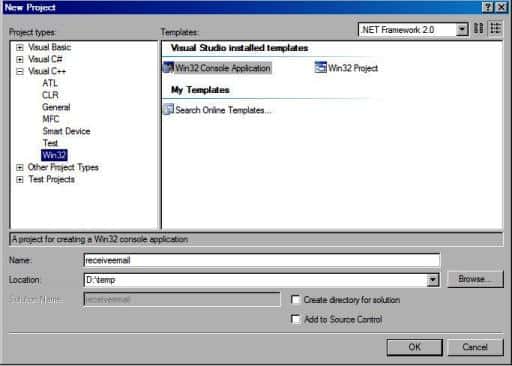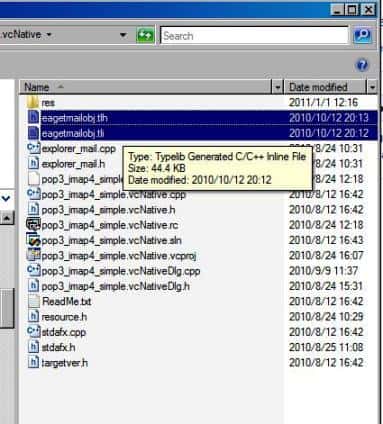Visual C++ - Mark email as read in POP3/IMAP4/EWS/WebDAV¶
If you want to leave a copy of email on the server, you should not call Delete method.
However, there is a problem, how can you know if the email has already been downloaded
(read)? If there is a way to identify the downloaded email, you can avoid downloading
the duplicated email from your POP3/IMAP4 server.
Every email has a unique identifier (UIDL) on POP3 server. POP3 UIDL is only unique in the email life time. That means if the email was deleted from the server, other email can use the old unique identifier. Another problem is: UIDL in POP3 server can be any number or characters, so we cannot use UIDL as the file name, because UIDL may contain invalid characters for file name.
To solve this problem, we have to store the UIDL to a txt file and synchronize it with server every time.
The following c++ example codes demonstrate how to mark the email as downloaded/read on POP3 server.
Sections:
Installation¶
Before you can use the following sample codes, you should download the EAGetMail Installer and install it on your machine at first. Full sample projects are included in this installer.
Add reference¶
To better demonstrate how to retrieve email and parse email, let’s create a Visual C++ console project named “receiveemail” at first, and then add the reference of EAGetMail in your project.

To use EAGetMail POP3 & IMAP4 ActiveX Object in your project, the first step is “Add header files of EAGetMail to your project”.
Please go to C:\Program Files\EAGetMail\Include\tlh
or C:\Program Files (x86)\EAGetMail\Include\tlh folder, find eagetmailobj.tlh and eagetmailobj.tli,
and then copy these files to your project folder. You can start to use it to retrieve email and parse email in your project.

Visual C++ - Mark email as read in POP3 - example¶
The following example codes demonstrate marking email as read/downloaded on POP3 server.
In order to run it correctly, please change email server, user, password, folder, file name value to yours.
Note
To get full sample projects, please download and install EAGetMail on your machine.
#include "stdafx.h"
#include <windows.h>
#include "eagetmailobj.tlh"
using namespace EAGetMailObjLib;
DWORD _getCurrentPath(LPTSTR lpPath, DWORD nSize)
{
DWORD dwSize = ::GetModuleFileName(NULL, lpPath, nSize);
if (dwSize == 0 || dwSize == nSize)
{
return 0;
}
// Change file name to current full path
LPCTSTR psz = _tcsrchr(lpPath, _T('\\'));
if (psz != NULL)
{
lpPath[psz - lpPath] = _T('\0');
return _tcslen(lpPath);
}
return 0;
}
int _tmain(int argc, _TCHAR* argv[])
{
const int MailServerPop3 = 0;
const int MailServerImap4 = 1;
const int MailServerEWS = 2;
const int MailServerDAV = 3;
const int MailServerMsGraph = 4;
// Initialize COM environment
::CoInitialize(NULL);
/// Create a folder named "inbox" under current exe file directory
// to save the emails retrieved.
TCHAR szPath[MAX_PATH + 1];
_getCurrentPath(szPath, MAX_PATH);
TCHAR szMailBox[MAX_PATH + 1];
wsprintf(szMailBox, _T("%s\\inbox"), szPath);
// Create a folder to store emails
::CreateDirectory(szMailBox, NULL);
IUIDLManagerPtr uidlManager;
bool isUidlLoaded = false;
// leave a copy of message on server
bool leaveCopy = true;
try
{
IMailServerPtr oServer = NULL;
oServer.CreateInstance(__uuidof(EAGetMailObjLib::MailServer));
oServer->Server = _T("pop3.emailarchitect.net");
oServer->User = _T("test@emailarchitect.net");
oServer->Password = _T("testpassword");
oServer->Protocol = MailServerPop3;
// Enable SSL/TLS connection, most modern email servers require SSL/TLS by default
oServer->SSLConnection = VARIANT_TRUE;
oServer->Port = 995;
// If your POP3 doesn't deploy SSL connection
// Please use
// oServer->SSLConnection = VARIANT_FALSE;
// oServer->Port = 110;
IMailClientPtr oClient = NULL;
oClient.CreateInstance(__uuidof(EAGetMailObjLib::MailClient));
oClient->LicenseCode = _T("TryIt");
// uidl is the identifier of every email on POP3/IMAP4 server, to avoid retrieve
// the same email from server more than once, we record the email uidl retrieved every time
// if you delete the email from server every time and not to leave a copy of email on
// the server, then please remove all the function about uidl.
TCHAR szUidlFile[MAX_PATH + 1];
wsprintf(szUidlFile, _T("%s\\uidl.txt"), szMailBox);
uidlManager.CreateInstance(__uuidof(EAGetMailObjLib::UIDLManager));
uidlManager->Load(szUidlFile);
isUidlLoaded = true;
oClient->Connect(oServer);
_tprintf(_T("Connected\r\n"));
IMailInfoCollectionPtr infos = oClient->GetMailInfoList();
_tprintf(_T("Total %d emails\r\n"), infos->Count);
// Remove the local uidl that is not existed on the server,
uidlManager->SyncUIDLEX(oServer, infos);
uidlManager->Update();
for (long i = 0; i < infos->Count; i++)
{
IMailInfoPtr pInfo = infos->GetItem(i);
IUIDLItemPtr uidl = uidlManager->FindUIDL(oServer, pInfo->UIDL);
if (uidl != nullptr)
{
// This email has been downloaded before
continue;
}
// Generate an unique file named based on current date time
// If you don't like it, you can use your method to generate file name
TCHAR szFile[MAX_PATH + 1];
SYSTEMTIME curtm;
::GetLocalTime(&curtm);
wsprintf(szFile, _T("%04d%02d%02d%02d%02d%02d%03d%d.eml"),
curtm.wYear,
curtm.wMonth,
curtm.wDay,
curtm.wHour,
curtm.wMinute,
curtm.wSecond,
curtm.wMilliseconds,
i);
TCHAR szFullPath[MAX_PATH + 1];
wsprintf(szFullPath, _T("%s\\%s"),
szMailBox, szFile);
IMailPtr oMail = oClient->GetMail(pInfo);
oMail->SaveAs(szFullPath, VARIANT_TRUE);
if(leaveCopy)
{
// Add the email uidl to uidl file to avoid we retrieve it next time.
uidlManager->AddUIDL(oServer, pInfo->UIDL, szFile);
}
else
{
oClient->Delete(pInfo);
// Remove UIDL from local uidl file.
uidlManager->RemoveUIDL(oServer, pInfo->UIDL);
}
}
}
catch(_com_error &ep)
{
_tprintf(_T("Error: %s"), (const TCHAR*)ep.Description());
}
//update the uidl list to a text file and then we can load it next time.
if (uidlManager != nullptr && isUidlLoaded)
{
uidlManager->Update();
}
return 0;
}
UIDL Manager¶
UIDLManager provides an easier way to maintain UIDL between your server and your local client. It stores UIDL collection to a local disk file and you can use this object to add, remove and search UIDL with this local file.
Visual C++ - Retrieve unread/new email in IMAP4/EWS/WebDAV - example¶
Because IMAP/EWS/WebDAV support read mail flag, with this feature, we can also retrieve unread/new email only from IMAP4/EWS/WebDAV like this
#include "stdafx.h"
#include <Windows.h>
#include "EAGetMailobj.tlh"
using namespace EAGetMailObjLib;
DWORD _getCurrentPath(LPTSTR lpPath, DWORD nSize)
{
DWORD dwSize = ::GetModuleFileName(NULL, lpPath, nSize);
if (dwSize == 0 || dwSize == nSize)
{
return 0;
}
// Change file name to current full path
LPCTSTR psz = _tcsrchr(lpPath, _T('\\'));
if (psz != NULL)
{
lpPath[psz - lpPath] = _T('\0');
return _tcslen(lpPath);
}
return 0;
}
int _tmain(int argc, _TCHAR* argv[])
{
const int MailServerPop3 = 0;
const int MailServerImap4 = 1;
const int MailServerEWS = 2;
const int MailServerDAV = 3;
const int MailServerMsGraph = 4;
const int GetMailInfos_All = 1;
const int GetMailInfos_NewOnly = 2;
const int GetMailInfos_ReadOnly = 4;
const int GetMailInfos_SeqRange = 8;
const int GetMailInfos_UIDRange = 16;
const int GetMailInfos_PR_ENTRYID = 32;
const int GetMailInfos_DateRange = 64;
const int GetMailInfos_OrderByDateTime = 128;
// Initialize COM environment
::CoInitialize(NULL);
// Create a folder named "inbox" under current exe file directory
// to save the emails retrieved.
TCHAR szPath[MAX_PATH + 1];
_getCurrentPath(szPath, MAX_PATH);
TCHAR szMailBox[MAX_PATH + 1];
wsprintf(szMailBox, _T("%s\\inbox"), szPath);
// Create a folder to store emails
::CreateDirectory(szMailBox, NULL);
try
{
IMailServerPtr oServer = NULL;
oServer.CreateInstance(__uuidof(EAGetMailObjLib::MailServer));
oServer->Server = _T("imap.emailarchitect.net");
oServer->User = _T("test@emailarchitect.net");
oServer->Password = _T("testpassword");
oServer->Protocol = MailServerImap4;
// Enable SSL Connection
oServer->SSLConnection = VARIANT_TRUE;
// Set 993 SSL IMAP4 port
oServer->Port = 993;
// If your IMAP doesn't deploy SSL connection
// Please use
// oServer->SSLConnection = VARIANT_FALSE;
// oServer->Port = 143;
IMailClientPtr oClient = NULL;
oClient.CreateInstance(__uuidof(EAGetMailObjLib::MailClient));
oClient->LicenseCode = _T("TryIt");
oClient->Connect(oServer);
_tprintf(_T("Connected\r\n"));
// retrieve unread/new email only
oClient->GetMailInfosParam->Reset();
oClient->GetMailInfosParam->GetMailInfosOptions = GetMailInfos_NewOnly;
IMailInfoCollectionPtr infos = oClient->GetMailInfoList();
_tprintf(_T("Total %d unread emails\r\n"), infos->Count);
for (long i = 0; i < infos->Count; i++)
{
IMailInfoPtr pInfo = infos->GetItem(i);
// Generate a random file name by current local datetime,
// You can use your method to generate the filename if you do not like it
TCHAR szFile[MAX_PATH + 1];
SYSTEMTIME curtm;
::GetLocalTime(&curtm);
::wsprintf(szFile, _T("%s\\%04d%02d%02d%02d%02d%02d%03d%d.eml"),
szMailBox,
curtm.wYear,
curtm.wMonth,
curtm.wDay,
curtm.wHour,
curtm.wMinute,
curtm.wSecond,
curtm.wMilliseconds,
i);
// Receive email from POP3 server
IMailPtr oMail = oClient->GetMail(pInfo);
// Save email to local disk
oMail->SaveAs(szFile, VARIANT_TRUE);
// mark unread email as read, next time this email won't be retrieved again
if( pInfo->Read == VARIANT_FALSE)
{
oClient->MarkAsRead(pInfo, VARIANT_TRUE);
}
// if you don't want to leave a copy on server, please use
// oClient->Delete(pInfo);
// instead of MarkAsRead
}
// Delete method just mark the email as deleted,
// Quit method expunge the emails from server exactly.
oClient->Quit();
}
catch (_com_error &ep)
{
_tprintf(_T("Error: %s"), (const TCHAR*)ep.Description());
}
return 0;
}
32bit/x64 ActiveX DLL¶
Seperate builds of run-time dll for 32 and x64 platform
| File | Platform |
| Installation Path\Lib\native\x86\EAGetMailObj.dll | 32 bit |
| Installation Path\Lib\native\x64\EAGetMailObj.dll | 64 bit |
Distribution¶
Standard EXE
For VB6, C++, Delphi or other standard exe application, you can distribute EAGetMailObj.dll with your application to target machine without COM-registration and installer. To learn more detail, please have a look at Registration-free COM with Manifest File.
Script
For ASP, VBScript, VBA, MS SQL Stored Procedure, you need to install EAGetMail on target machine by EAGetMail installer, both 32bit/x64 DLL are installed and registered.
Appendix
- Retrieve email and parse email in Visual C++ - Tutorial
- EAGetMail POP3/IMAP4 Component SDK
- Using UIDLManager to mark email as read/downloaded
- Download only unread/new emails from IMAP or MS Exchange Server
- Search emails and filter emails on IMAP or MS Exchange Server
- Retrieve emails from specified folder in IMAP or MS Exchange Server
Comments
If you have any comments or questions about above example codes, please click here to add your comments.
